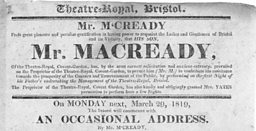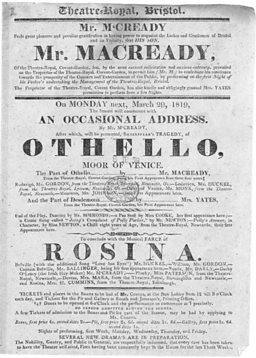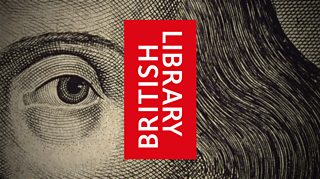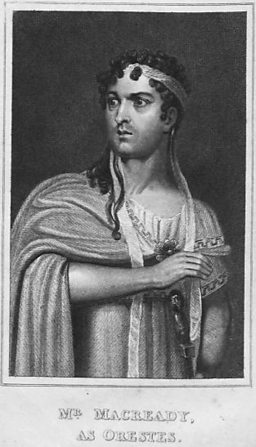Bristol Theatre Royal keeps it in the family
M'Cready and Macready team up at Bristol Theatre Royal.
This playbill dated March 29th, 1819 depicts a father and son team at the Theatre Royal, Bristol. The father is William Macready the elder (1755 - 1829) an Irishman.
-
![]()
Much ado near me
Hear more Shakespeare stories on BBC Radio Bristol
-
![]()
Shakespeare Festival 2016
The BBC celebrates the genius of the bard

After a career as an actor manager around the regions, Macready took on the lease of the Theatre Royal in Bristol in 1819 – the date of this playbill.
Destined for a legal profession, financial problems forced him to make a living in a profession he disliked - as an actor.
This is Macready’s first night as manager and he wants to make an impact. He’s going to address the audience, possibly to tell them about his plans and his pride to be working with his son, an established actor at a prestigious London theatre, who has persuaded his manager to release him for the first night of the Bristol theatre.
He’s also brought in the actress Elizabeth Yates who had launched her theatrical career in her father’s theatre as Desdemona a few years earlier.
Unlike his father, William Charles Macready, (1793 - 1873), had enjoyed a gentleman’s education.
Destined for a legal profession, financial problems forced him to make a living in a profession he disliked - as an actor.
Initially a temporary occupation as an actor-manager, his way of working was to pave the way for modern theatre.
In 1810 he made his debut as Romeo in his father’s company in Birmingham, and quickly made his name in provincial theatres.

Here he is appearing as Othello which alongside Iago, Hamlet, Lear, and Richard II were the roles he became best known for.
He shunned the corrupted versions of Shakespeare’s plays that were widely used and returned to the earliest printed versions of the texts
He managed Covent Garden and then Drury Lane a few years later.
Although he was a good actor, he was best known for the idea that everyone from actors to those behind the scenes should be guided by the central ideas of the dramatist. This principle of unity is at the heart of theatre today.
Until then leading actors learned their lines in private and performed their roles any way they wished. Macready established rehearsals where actors worked together to create a performance.
Historically accurate costumes and scenery were used.
He shunned the corrupted versions of Shakespeare’s plays that were widely used, and returned to the earliest printed versions of the texts
Plays that received this treatment included As You Like It, Macbeth, King Lear, Henry V, and The Tempest.
About Shakespeare on Tour
From the moment they were written through to the present day, Shakespeare’s plays have continued to enthral and inspire audiences. They’ve been performed in venues big and small – including inns, private houses and emerging provincial theatres.

BBC English Regions is building a digital picture which tracks some of the many iconic moments across the country as we follow the ‘explosion’ in the performance of The Bard’s plays, from his own lifetime to recent times.
Drawing on fascinating new research from Records of Early English Drama (REED), plus the British Library's extensive collection of playbills, as well as expertise from De Montfort University and the Arts and Humanities Research Council, Shakespeare on Tour is a unique timeline of iconic moments of those performances, starting with his own troupe of actors, to highlights from more recent times. Listen out for stories on Shakespeare’s legacy on your BBC Local Radio station from Monday 21 March, 2016.
You never know - you might find evidence of Shakespeare’s footsteps close to home…
Craig Henderson, BBC English Regions

Related Links
-
![]()
Shakespeare Lives
The nation’s greatest performing arts institutions mark 400 years since the Bard's death
Shakespeare on Tour: Around Bristol
-
![]()
Bath's trailblazing Theatre Royal
18th century tourists flock to the city for bathing, culture, and the theatre
-
![]()
Did Shakespeare visit Bristol in 1597?
Civic accounts show a high amount of performances in Bath
-
![]()
Bath proves popular on Shakespeare's South-West tour
Civic accounts show a high amount of performances in Bath
Shakespeare on Tour: Around the country
-
![]()
The 'Young Roscius' storms Manchester
Boy actor William Betty treads boards at ten
-
![]()
Will Kemp dances to Norwich
The journey of Shakespeare's former clown
-
![]()
Domestic Calamity postpones performance
Did the 'curse of Macbeth' strike?
-
![]()
Jonathan Miller and the Cambridge Footlights
Much ado about Jonathan Miller's Shakespeare










